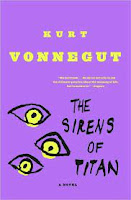Hugo, oh Hugo, you underachieving, unambitious award... Such is the sentiment I arrive at comparing the content regularly making Hugo news today to a high quality book of yesteryear that was once upon a time nominated for the award. To think the likes of Leigh Brackett’s The Long Tomorrow, Algis Budry’s Who?, or Theodore Sturgeon’s Venus Plus X could have been in the spotlight of genre makes the works by John Scalzi, Ann Leckie, N.K. Jemisin, etc. quiver in weakness. No offence to those writers; they are all successful in their own right, but it’s clear quality sales are not a guarantee of quality substance. If only works celebrated today by the award had the class and sophistication of Kurt Vonnegut’s The Sirens of Titan (1959)…
Remote-controlled humans, Mars attacking Earth, UFOs, robots—such are the fever dreams fueling a lot of Golden and Silver Age science fiction (and if I had to be fair, books even today). But in The Sirens of Titan, these devices are deployed in the service of satire, humanism, philosophy and dark humor. A doomsday tale that peels away its layers of doom until only the concept of the individual’s free will exists, in Vonnegut’s novel the reader is forced to confront realities of existence, even if they are not technically part of our reality.
There is no real main character in The Sirens of Titan. Instead, the narrative takes turns hitching rides with a few characters, following their lives or recounting their histories as they impact the overarching story and theme. I likened the narrative mentally to a small pod of dolphins jumping in and out of the water—the arcs regular in appearance but differing in number and length. One such “dolphin” is the world’s richest man, Malachi Constant. Despite his position of power, Constant becomes a tool in the war brewing between Mars and Earth. A likewise wealthy dolphin, Winston Rumsfoord creates his own private space ship which he uses to travel back and forth between Mars and Earth. Having fantastical experiences on his journeys, strange things happen—physical, temporal, and otherwise. But he cannot escape his own reality. Unk is a Martian soldier who has no memory of his past. Antenna installed in his head, he follows the orders of Martian military command. His backstory proves to be most interesting—life before the antennae. And the fourth “dolphin” is perhaps best discovered while reading. Showing the lengths people will go to have their needs met, patience is a virtue, but not always enough.
If you are unware, Vonnegut’s style of writing is sly—very sly. Nonchalantly tossing off the most vanilla maxims possible, they nevertheless stick cleanly to the ironic mode of exposition. This, then that, hmm, la-dee-dah, and before the reader knows it they are smiling to themselves, not only at the delicate but deep humor, but also the simple profundity the words are able to achieve. Readers looking for a good ol’ fashioned space adventure will need to look elsewhere. But for readers with a mind between the lines and an underlying awareness of the larger questions at stake in the characters’ lives, Vonnegut offers a spring waltz over cobblestones.
While entirely different reading experiences, I would put The Sirens of Titan alongside Stanislaw’s Lem’s Solaris in terms of meat and meaning. One a delicately sarcastic, almost tongue-in-cheek commentary through the lens of space travel, space wars, and space existence, and the other a meeting with the utterly strange, utterly alien, and utterly existential, both novels nevertheless feature humanity confronting the limitations of individual existence. Regardless the novel, all characters would seem to have a leg up on their situation. Whether it be money, power, long-life, knowledge, etc., these elements prove not to be enough when the exigencies of existence require more.
While I commit the sin of discrimination, it’s fair to say The Sirens of Titan will not be to the taste of the majority of Hugo readers today. Meaning and intent vague rather than obvious, action and sensawunda not a focus, it’s likely to get poor reviews from that group—boring characters, little story, confusion, etc. For readers of literary fiction, or perhaps just science fiction with a humanist/philosophical bend, Vonnegut has something for you. Forget about the year published. Forget about the fact Vonnegut is no longer as well-known as he once was. Forget the words “robot” and “radio-controlled humans”, etc. Yes, they exist, but as devices to transform. The message—the substance—of the novel is timeless. If only the Hugo crowd hadn’t shifted away from such novels…


Give me Vonnegut over today's Hugo winners anytime. I've been rereading his novels over the past few years, just getting to Breakfast of Champions this February, which I enjoyed more this time around. My favorites are Bluebeard, Mother Night and God Bless You, Mr Rosewater. No one writes like Vonnegut (no matter what some cover blurbs would want to have you believe).
ReplyDeleteCheers
Klaas